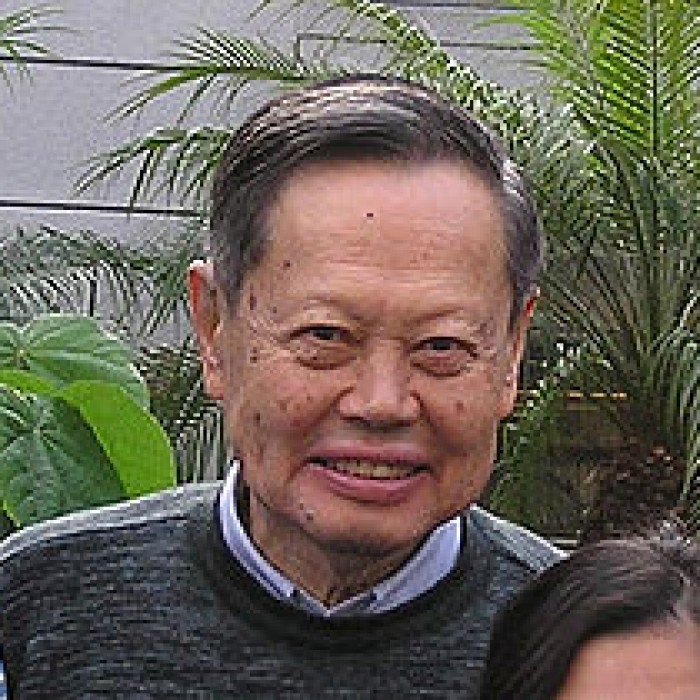
Chen-Ning Franklin Yang, also known as Yang Zhenning (Born October 1, 1922), is a Chinese-born American physicist who works on statistical mechanics and particle physics.
He and Tsung-dao Lee received the 1957 Nobel Prize in Physics for their work on parity nonconservation of weak interaction.
The two proved theoretically that one of the basic quantum-mechanics laws, the conservation of parity, is violated in the so-called weak nuclear reactions, those nuclear processes that result in the emission of beta or alpha particles.
Yang was born in Hefei, Anhui, China; his father, Yang Wu-Chih (1896–1973), was a mathematician, and his mother, Luo Meng-hua, was a housewife.
Yang attended elementary school and high school in Beijing, and in the autumn of 1937 his family moved to Hefei after the Japanese invaded China.
In 1938 they moved to Kunming, Yunnan, where the National Southwestern Associated University, Lianda, was located. In the same year, as a second year student, Yang passed the entrance examination and studied at Lianda.
He received his bachelor's degree in 1942, with his thesis on the application of group theory to molecular spectra, under the supervision of Ta-You Wu.
He continued to study graduate courses there for two years under the supervision of Wang Zhuxi, working on statistical mechanics.
In 1944 he received his master's degree from Tsinghua University, which had moved to Kunming during the Sino-Japanese War (1937-1945).
Yang was then awarded a scholarship from the Boxer Indemnity Scholarship Program, set up by the United States government using part of the money China had been forced to pay following the Boxer Rebellion.
From 1946, Yang studied with Edward Teller (1908–2003) at the University of Chicago, where he received his doctorate in 1948.
In 1949 he was invited to do his research at the Institute for Advanced Study in Princeton, New Jersey, where he began a period of fruitful collaboration with Tsung-Dao Lee.
In 1963, Princeton University Press published his textbook, Elementary Particles.
In 1965 he moved to Stony Brook University, where he was named the Albert Einstein Professor of Physics and the first director of the newly founded Institute for Theoretical Physics.
He retired from Stony Brook University in 1999, assuming the title Emeritus Professor. In 2010, Stony Brook University honored Yang's contributions to the university by naming its newest dormitory building C. N. Yang Hall.
He has been elected a Fellow of the American Physical Society, the Chinese Academy of Sciences, the Academia Sinica, the Russian Academy of Sciences, and the Royal Society.
He was awarded honorary doctorate degrees by Princeton University (1958), Moscow State University (1992), and the Chinese University of Hong Kong (1997).
Yang married Chih-li Tu, a teacher, in 1950 and has two sons and a daughter with her: Franklin Jr., Gilbert and Eulee.
Yang became a U.S. citizen in 1964. He now resides in China, and he was granted permanent residency in China in 2005. On Yang's religious views, he is an agnostic.
Source: Link

1564 - 1616

1803 – 1882

1854 – 1900

1942 – 2016

1928 – 2014

1835 – 1910

1869 – 1948

1884 – 1962
1898 – 1963

1929 – 1993

1879 – 1955

1809 – 1865

1807 – 1870

1800 – 1859

1795 – 1821

1755 – 1793

1984 -

1989 – 2011

1943 – 2001

1815 – 1902

1929 – 1994

1767 – 1848
